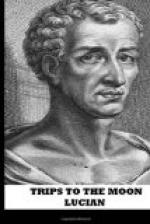{84} Horse ants, from [Greek], a horse; and [Greek], an ant.
{85a} From [Greek], olus, any kind of herb; and [Greek], penna, a wing.
{85b} Millii jaculatores, darters of millet; millet is a kind of small grain.—A strange species of warriors!
{85c} Alliis pugnantes, garlic fighters: these we are to suppose threw garlic at the enemy, and served as a kind of stinkpots.
{85d} Pulici sagittarii, flea-archers.
{85e} Venti cursores, wind courser.
{86a} Passeres glandium, acorn sparrows.
{86b} Equi grues, horse-cranes.
{87a} Air-flies.
{87b} Gr. [Greek], air-crows; but as all crows fly through the air, I would rather read [Greek], which may be translated air-dancers, from [Greek], cordax, a lascivious kind of dance, so called.
{88a} Gr. [Greek], Caulo fungi, stalk and mushroom men.
{88b} Gr. [Greek], cani glandacii, acorn-dogs.
{88c} Gr. [Greek], nubicentauri, cloud-centaurs.
{88d} The reason for this wish is given a little farther on in the History.
{89} See Hom. Il. II.. 1, 459.
{90a} Some authors tell us that Sagittarius was the same as Chiron the centaur; others, that he was Crocus, a famous hunter, the son of Euphemia, who nursed the Muses, at whose intercession, he was, after his death, promoted to the ninth place in the Zodiac, under the name of Sagittarius.
{90b} The inhabitants of the moon.
{92} A good burlesque on the usual form and style of treaties.
{93} Gr. [Greek], ignens, fiery, [Greek], flaming, [Greek], nocturnus, nightly, [Greek], menstruus, monthly, [Greek], multi lucius, many lights. These all make good proper names in Greek, and sound magnificently, but do not answer so well in English. I have therefore preserved the original words in the translation.
{94} Here Lucian, like other story-tellers, is a little deficient in point of memory. If they eat, as he tells us, nothing but frogs, what use could they have for cheese?
{96} Of which we shall see an account in the next adventure.
{97} The city of Lamps.
{98a} The cloud cuckoo.
{98b} See his comedy of the Birds.
{104a} Salsamentarii: Salt-fish-men.
{104b} Triton-weasels.
{104c} Greek, [Greek], cancri-mani, crab’s hands.
{104d} Thynno-cipites, tunny-heads, i.e., men with heads like those of the tunny-fish.
{105a} Greek, [Greek], crab-men.
{105b} [Greek], sparrow-footed, from [Greek], passer marinus.
{109} Maris potor, the drinker up of the sea. AEolocentaurus and Thalassopotes were, I suppose, two Leviathans.
{113} One of the fifty Nereids, or Sea-Nymphs; so called, on account of the fairness of her skin: from [Greek], gala, milk; of the milky island, therefore, she was naturally the presiding deity.




